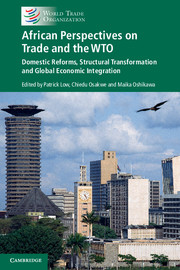 African Perspectives on Trade and the WTO
African Perspectives on Trade and the WTO Book contents
- African Perspectives on Trade and the WTO
- African Perspectives on Trade and the WTO
- Copyright page
- Contents
- Figures
- Plates
- Contributors
- Message
- Joint Foreword
- Book part
- Glossary
- Disclaimer
- 1 Introduction and Overview
- Part I The Future of the Multilateral Trading System: Perspectives from African Policy-Makers and Partners
- 2 African Union Priorities at the WTO
- 3 Economic Diversification in Africa’s Number One Economy
- 4 Trade, Investment and Development
- 5 Integration into Global and Regional Value Chains – How Is It Done? The Experience of Lesotho in the Textiles and Apparel Sector
- 6 From Marrakesh to Nairobi: Africa – A Force for the World Trading System: From the Past Twenty Years to the Next Twenty Years
- 7 Building Capacity in Africa to Facilitate Integration into Global Value Chains: Contributions from the ITC
- 8 Investment and Trade Rules: Increasing the Stock of African Foreign Direct Investment Flows
- 9 Deepening African Integration: Intra-African Trade for Development and Poverty Reduction
- Part II Africa’s Participation in the Rules-Based Multilateral Trading System
- Part III Selected Development Experiences and Perspectives
- Book part
- Index
- Plate Section (PDF Only)
- Book part
- References
3 - Economic Diversification in Africa’s Number One Economy
from Part I - The Future of the Multilateral Trading System: Perspectives from African Policy-Makers and Partners
Published online by Cambridge University Press: 27 October 2016
- African Perspectives on Trade and the WTO
- African Perspectives on Trade and the WTO
- Copyright page
- Contents
- Figures
- Plates
- Contributors
- Message
- Joint Foreword
- Book part
- Glossary
- Disclaimer
- 1 Introduction and Overview
- Part I The Future of the Multilateral Trading System: Perspectives from African Policy-Makers and Partners
- 2 African Union Priorities at the WTO
- 3 Economic Diversification in Africa’s Number One Economy
- 4 Trade, Investment and Development
- 5 Integration into Global and Regional Value Chains – How Is It Done? The Experience of Lesotho in the Textiles and Apparel Sector
- 6 From Marrakesh to Nairobi: Africa – A Force for the World Trading System: From the Past Twenty Years to the Next Twenty Years
- 7 Building Capacity in Africa to Facilitate Integration into Global Value Chains: Contributions from the ITC
- 8 Investment and Trade Rules: Increasing the Stock of African Foreign Direct Investment Flows
- 9 Deepening African Integration: Intra-African Trade for Development and Poverty Reduction
- Part II Africa’s Participation in the Rules-Based Multilateral Trading System
- Part III Selected Development Experiences and Perspectives
- Book part
- Index
- Plate Section (PDF Only)
- Book part
- References
Summary
Nigeria is the largest economy in Africa, with a GDP in excess of US$ 500 billion, dependent on oil and gas exports for the bulk of government revenues as well as foreign exchange. Its growth – which averaged about 7 per cent in the decade between 2005 and 2014 – has in recent years been driven by the non-oil sectors: services, agriculture and manufacturing. The principal challenge for the President Buhari administration, which took office in May 2015, is to build on this trend, by diversifying export income and the sources of government revenues, as well as kick-starting the long-overdue task of industrializing the Nigerian economy. One of the goals of this approach is to achieve robust, stable and predictable growth, free from short-to-medium-term cycles of boom and bust.
The strategy for Nigerian economic diversification is based on sustained domestic institutional and structural reforms, the Nigeria Industrial Revolution Plan (NIRP), a sectoral focus on core services (finance, telecommunications, transportation, energy), investment in infrastructure, support for manufacturing and for small and medium-sized enterprises and access to enlarged markets through integration into regional and global value chains.
Coupled with these priorities is the premium accorded to high-quality governance, plugging fiscal leakages and frontally addressing the systemic challenge of corruption. Successful implementation will require buy-in and ownership by Nigerians, support from Nigeria’s external partners and patience from investors in ongoing reforms.
- Type
- Chapter
- Information
- African Perspectives on Trade and the WTODomestic Reforms, Structural Transformation and Global Economic Integration, pp. 18 - 23Publisher: Cambridge University PressPrint publication year: 2016
